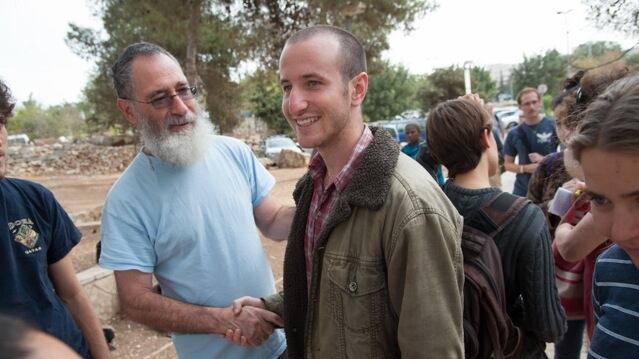Dear Yoav,My name is Jesse Rothman, and Mori is my older brother. I believe that we have met. We have certainly corresponded. Throughout this process, I have been following responses to Mori's refusal to serve in the IDF and I read your letter in Tablet with interest as well. Mori is currently in jail and, since I am not Mori, I cannot speak on his behalf. But I would love to respond with some of my own thoughts.
Clearly, you and I hold many political priorities in common. We share a vision in which all people are treated equally, and we agree that controlling the lives of millions of Palestinians violently and against their will is incompatible with such a vision. We agree that the occupation is immoral and extremely destructive for Israelis, as well as Palestinians. However, there are a number of points in your letter that I find problematic.

First, you fail to recognize that the IDF is a political entity with certain political goals, goals that I often find unpalatable. There is a temptation to place militaries outside the realm of politics because it seems somehow insensitive to address these issues when sons, fathers, and brothers are dying. However, in Israel, just like everywhere else in the world, this is a mistake. There is nothing apolitical about militaries. The IDF is an extremely political entity and it is organized to protect only some citizens, and only sometimes. It bears stating explicitly: when serving in the IDF, you are not serving the people of Israel, or the Jewish people. You are serving the state of Israel and you are serving the government of Israel. There are some people who believe these categories are interchangeable, and certainly there is some overlap. They are, however, by no means synonymous.
Also, I think you fail to reckon with the magnitude of problems within the state of Israel, and, by extension, the IDF. You are right to say that reducing Israel to the occupation is irresponsible, but assuming that—aside from the occupation—Israel is a healthy, liberal democracy is equally myopic and damaging. Currently, the state of Israel is organized thoroughly and systematically to privilege one type of citizen (Jews) over all other types of people. The government of Israel is comprised of a maximalist, hyper-nationalist, misogynistic, and militaristic group of leaders, who are likely to become worse with the Likud-Beitenu merger. The IDF supports and allows this system by using the threat of force to ensure that Jews occupy a privileged space. This is corrupt and should be resisted. Therefore, the IDF should be resisted.
Moreover, defining Mori's actions as a form of disengagement from Israel is wrong. You ask why Mori refused to do national service. He did not. As far as I know, he would have loved to do national service in lieu of military service. However, in order for Israeli men to be allowed to do national service, they first need to receive an exemption from the military. Mori did not receive this exemption and therefore that option was closed from the beginning. But he certainly believes in "national service," broadly defined. Mori has sacrificed his freedom because he wants to change the state and he is spending his life trying to make the place more just and free. The fact that he is choosing not to try to make change "from within" does not mean he is abdicating responsibility. If anyone is disengaging, it is myself and people like me. I chose not to sacrifice and I chose to move back to America because I wanted an easier life. Mori, on the other hand, is struggling to make Israel better.
Lastly, you seem to suggest that the only way to gain credibility in Israeli society is to use weapons and wear fatigues. If this is true, it is surely a tragedy. It is also a path of infinite regress: you get more credibility by serving in the IDF, you get more credibility by not questioning Jewish privilege, you get more credibility by ignoring some human rights violations (like Operation Cast Lead) because they are politically popular. Where does it stop? For Mori, and for others, it stops with enacting unjust violence. Where does it stop for you?
Now, all of this does not mean that military defense per se is illegitimate. Security and safety for all people should be at the center of state-craft. Neither does it mean that Israel does not have real security concerns. However, I do not trust the IDF to be truly "defensive" and I do not believe militarism is a long-term security solution. The IDF has a hammer so it only sees nails. If you believe that the IDF's actions are necessary and good for security, then the burden of proof is on you. Because, inarguably, its actions are violent and destructive. If the trade-off for this destruction is truly a safer environment then perhaps this price is justified. However, you must prove that the IDF's violence leads to a safer Israel (and not, as I would posit, often more danger), not simply assume this to be true. This assumption leads to a wanton application of violence against millions of people and that is unacceptable.
To be sure, I am not condemning individuals like yourself or like your comrades, and certainly Mori isn't. The question is not whether soldiers are moral or thoughtful or exceptionally skillful. I do not doubt that your colleagues were professional and admirable, and that you can look back on your service as a time where you behaved bravely in morally complex situations. However, the relevant question is whether the system is corrupt and unhelpful. In the end, I believe that there are many ways to serve one's country, and, because of its political agenda and inherent tendency towards violence, I don't believe that the IDF is the best one.
I look forward to continuing our correspondence.
Sincerely,
Jesse





